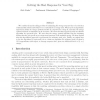Free Online Productivity Tools
i2Speak
i2Symbol
i2OCR
iTex2Img
iWeb2Print
iWeb2Shot
i2Type
iPdf2Split
iPdf2Merge
i2Bopomofo
i2Arabic
i2Style
i2Image
i2PDF
iLatex2Rtf
Sci2ools
107
click to vote
SWAT
2004
Springer
2004
Springer
Getting the Best Response for Your Erg
We consider the speed scaling problem of minimizing the average response time of a collection of dynamically released jobs subject to a constraint A on energy used. We propose an algorithmic approach in which an energy optimal schedule is computed for a huge A, and then the energy optimal schedule is maintained as A decreases. We show that this approach yields an efficient algorithm for equi-work jobs. We note that the energy optimal schedule has the surprising feature that the job speeds are not monotone functions of the available energy. We then explain why this algorithmic approach is problematic for arbitrary work jobs. Finally, we explain how to use the algorithm for equi-work jobs to obtain an algorithm for arbitrary work jobs that is O(1)-approximate with respect to average response time, given an additional factor of (1 + ǫ) energy.
| Added | 02 Jul 2010 |
| Updated | 02 Jul 2010 |
| Type | Conference |
| Year | 2004 |
| Where | SWAT |
| Authors | Kirk Pruhs, Patchrawat Uthaisombut, Gerhard J. Woeginger |
Comments (0)

